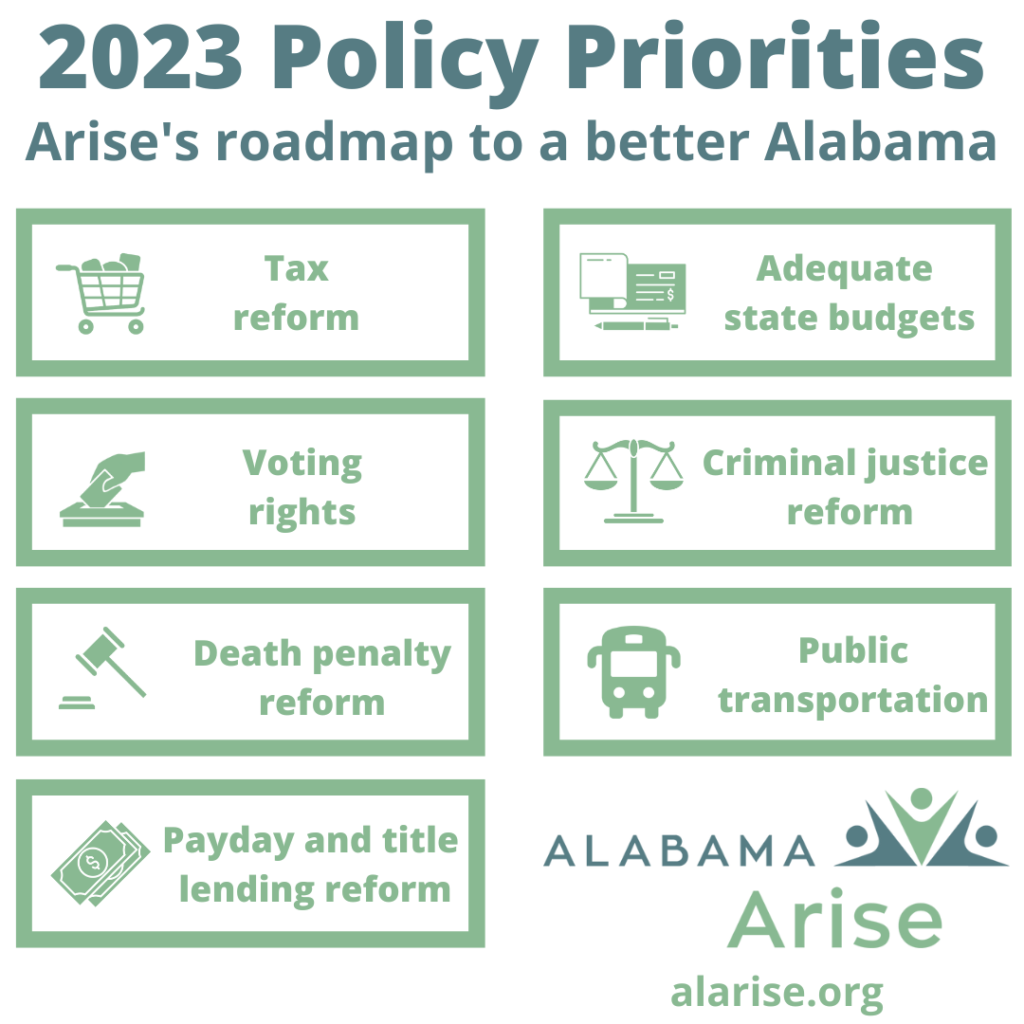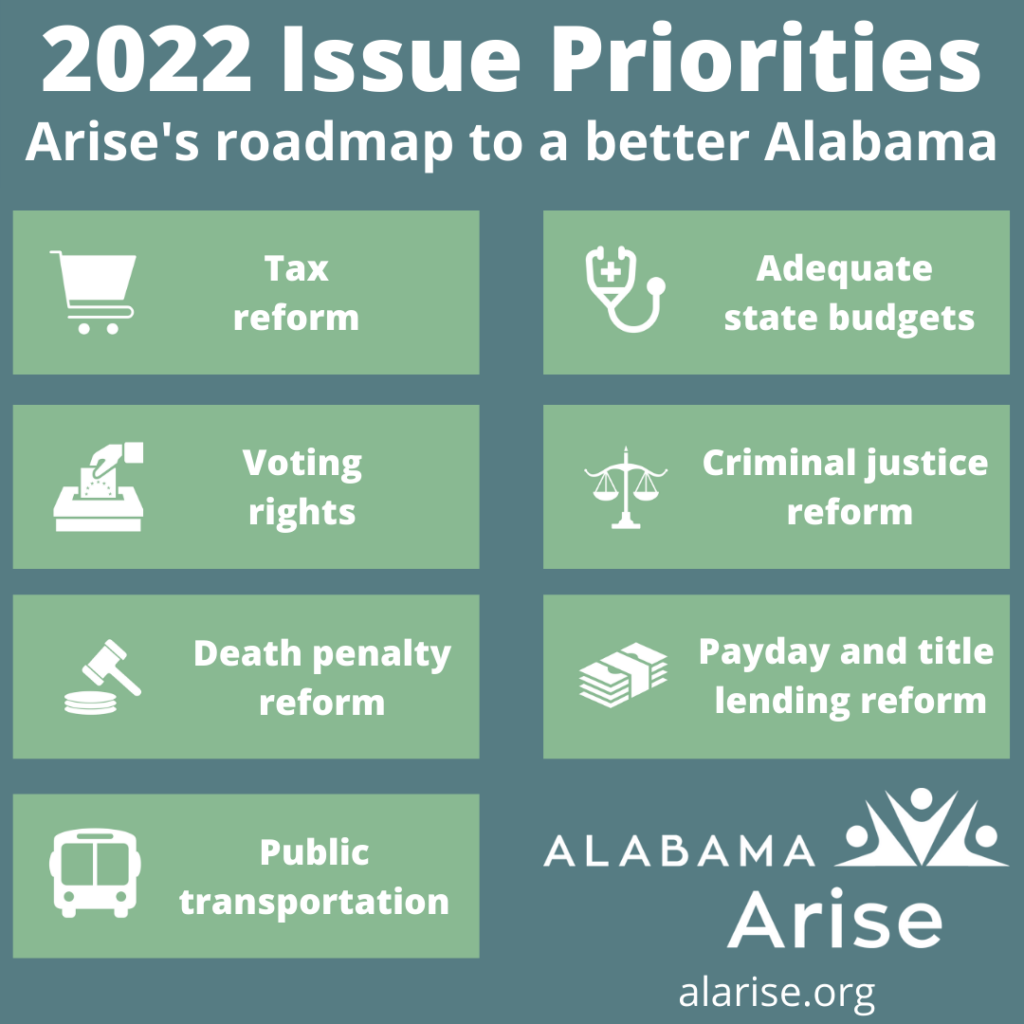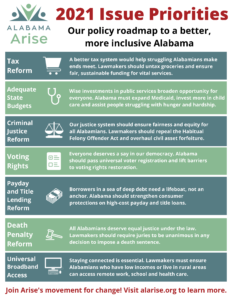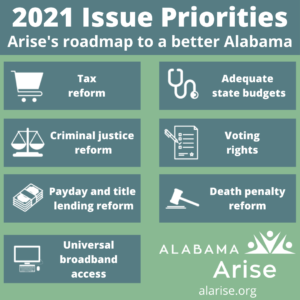Expanding Medicaid and ending the state sales tax on groceries will remain top goals on Alabama Arise’s 2023 legislative agenda. More than 400 members voted on Arise’s issue priorities in recent days after the organization’s annual meeting Saturday. The seven issues chosen were:
- Adequate budgets for human services like education, health care and child care, including Medicaid expansion to make health coverage affordable for all Alabamians.
- Tax reform, including untaxing groceries and capping the state’s upside-down deduction for federal income taxes, which overwhelmingly benefits rich households.
- Voting rights, including automatic universal voter registration, removal of barriers to voting rights restoration for disenfranchised Alabamians, and other policies to expand and protect multiracial democracy in the state.
- Criminal justice reform, including retroactive application of state sentencing guidelines and repeal of the Habitual Felony Offender Act.
- Death penalty reform, including a law to require juries to be unanimous in any decision to impose a death sentence.
- Public transportation to empower Alabamians with low incomes to stay connected to work, school, health care and their communities.
- Payday and title lending reform to protect consumers from getting trapped in debt.
“Arise believes in dignity, equity and justice for everyone,” Alabama Arise executive director Robyn Hyden said. “Our 2023 issue priorities reflect the need to work together to break down policy barriers that keep people in poverty, and that disproportionately harm Black and Hispanic Alabamians. We must build a healthier, more just and more inclusive future for our state.”
The time is right to expand Medicaid in Alabama
One essential step toward a healthier future for Alabama is to ensure everyone can afford the health care they need. Arise members believe Medicaid expansion is a policy path to that destination, and research provides strong support for that position.
Expanding Medicaid would reduce racial health disparities and remove financial barriers to health care for more than 340,000 Alabamians. It would support thousands of new jobs across the state. And most importantly, it would save hundreds of lives every year.
Medicaid expansion would ensure health coverage for more than 220,000 Alabamians caught in the coverage gap. These residents earn too much to qualify for the state’s bare-bones Medicaid program but too little to afford private plans. Expansion also would benefit another 120,000 Alabamians who are stretching to pay for coverage they cannot readily afford.
Alabama is one of only 12 states that have not yet expanded Medicaid to cover adults with low incomes. But an Alabama Arise poll earlier this year found that more than seven in 10 Alabamians (71.5%) support Medicaid expansion. That figure included 65.8% of Republican voters.
“Medicaid expansion would boost our economy and improve the lives of hundreds of thousands of Alabamians,” Hyden said. “It’s time for Gov. Kay Ivey and lawmakers to say yes to the generous federal incentives for Medicaid expansion. Making this crucial investment in Alabamians’ well-being now will make our state better for decades to come.”
Why and how Alabama should untax groceries
Alabama’s state grocery tax makes it harder for people with low incomes to make ends meet. The tax adds hundreds of dollars a year to the cost of a basic necessity for families. And most states have abandoned it: Alabama is one of only three states with no sales tax break on groceries.
The state sales tax on groceries brings in roughly 6% of the Education Trust Fund’s annual revenue. But lawmakers have a path available to end the state grocery tax while protecting funding for public schools. Arise will continue to support legislation to untax groceries and replace the revenue by capping the state income tax deduction for federal income taxes (FIT).
The FIT deduction is a skewed tax break that overwhelmingly benefits the richest households. It is also exceedingly rare: Alabama is one of only two states to allow this deduction in full. The FIT deduction and grocery tax are two policies that contribute heavily to Alabama’s upside-down tax system. On average, Alabamians with low and moderate incomes must pay twice as much of what they make in state and local taxes as the richest households do.
“By untaxing groceries and capping the FIT deduction, lawmakers can make Alabama’s tax system more just and equitable,” Hyden said. “This plan would empower more families to keep food on the table while also protecting funding for our public schools. The Legislature should seize this opportunity to make life better for every Alabamian.”





